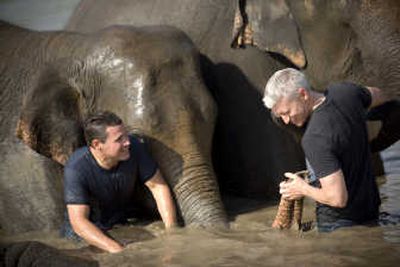CNN reports on Earth’s health

It’s a tough world, all right.
Too bad it’s not tougher.
Right now Earth is looking pretty fragile as it suffers from increasing human punishment.
This isn’t really news, of course. But CNN has packed the two-night, four-hour “Planet in Peril” with information and images that give a familiar story new urgency.
Airing tonight and Wednesday at 6 p.m., “Planet in Peril” dispatched correspondents Anderson Cooper and Dr. Sanjay Gupta, as well as Animal Planet wildlife biologist Jeff Corwin, to report on far-flung instances of “environmental change.”
That encompasses four key areas: climate change, vanishing natural habitats, disappearing species and human overpopulation.
“At first glance, it may seem unfocused,” said executive producer Charlie Moore. “But those are the four pillars.
“Almost everything falls under them, and they’re all interconnected.
“For instance, you can’t talk about endangered species without dealing with overconsumption of the world’s natural resources and overpopulation.”
CNN’s first high-definition production, “Planet in Peril” was shot – beautifully – all over the planet, beginning last February in Brazil, where Cooper and Corwin explore connections between the rapid deforestation of the Amazon River Basin and changes in the world’s climate.
Other points of interest include Cambodia, Alaska, Wyoming’s Yellowstone National Park, Greenland and the African nation of Chad.
One segment finds Cooper and Corwin in Bangkok. They accompany undercover police attempting, with little success, to raid shops that illegally traffic in wildlife from all over the world.
In a segment from China, Gupta reports that, partly thanks to economic boom and a surging population, China can claim 16 of the world’s 20 most air-polluted cities.
More than half of that vast country’s rivers are severely polluted, he adds.
He interviews the young widow of a farmer who died of colon cancer at age 30, just one of many cases in a community dubbed a “cancer village.”
No wonder. The local river used for drinking and irrigation is polluted with carcinogens from nearby iron-ore mining operations that have gone on for decades.
Then the scene shifts to New York, where Cooper submits to a “body burden assessment” – a complex, comprehensive blood test measuring the presence of 246 synthetic chemicals.
Weeks pass while Cooper’s blood is analyzed. Then he learns, not happily, that he tested positive for more than 100 of those chemicals, including the long-banned carcinogens DDT and PCBs.
No worries, says the president of the American Chemistry Council in an interview: “Just because we find chemicals in the body doesn’t mean that it causes disease.”
Maybe not.
But, as Cooper notes, no one knows for sure what the health implications might be.
“I wanted each night’s episode to end up at home (in the U.S.),” Moore said.
“The fact that bad things are happening in faraway places doesn’t make them any less important.
“But I wanted to make sure that the issues don’t feel too removed from the viewer’s everyday life.”